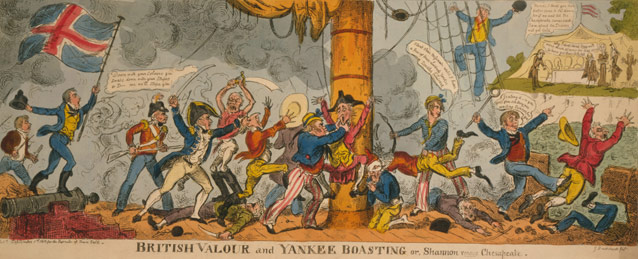Both privateers and American naval vessels had crews that included white and black Americans as well as men from other countries. Some were experienced sailors; others were “green” landsmen. Aboard ship there was a rough equality among seamen with African Americans living and serving next to European Americans. Ashore, however, racial prejudice persisted.
"Sailors “are full of ‘rights’ and ‘wrongs’ of ‘justice and injustice,’” and of defining crimes, and asserting “the butts and bounds of national and individual rights.”" Amos G. Babcock, surgeon from Massachusetts

Library of Congress, Prints and Photographs Division
Whether aboard privateers or navy ships, Americans expressed an independent spirit, which may have given them an edge in combat. The American tars, as sailors were often called, demonstrated a sense of entitlement that reflected their faith in the rights of men and their belief in a peculiar notion of liberty—a liberty that frequently revealed itself in unruly behavior that owed as much to a tradition of rowdiness as it did to the democratic ideals of the American Revolution. Ordinarily ships were autocracies, with the captain reigning supreme. On American ships, officers often had to follow rather than lead their crews. When the captain on the USS Syren died, the lieutenant asked the crew if they wanted to continue the voyage or return to port—the crew voted to stay at sea. Aboard a privateer during the war, a captain shortened the rum ration, only to find that his crew refused to work without getting their just share of grog. After two days, and with a squall coming on, the captain “found that his government was democratical” and he “conceded to the large and fearful majority; and the New England spirit carried the day.”
This spirit also came to the fore when Americans were held as prisoners of war. The American tar’s “wild reckless, daring, enterprizing character” flummoxed British officials who could only exclaim “that it would puzzle the d[evi]l to keep them in good order.” Whereas, the American militia and regular military might also be difficult to control, sailors seemed to have a special penchant for liberty. Serving as a surgeon aboard a privateer, Amos G. Babcock came to know and appreciate the common seamen, recognizing that sailors “are full of ‘rights’ and ‘wrongs’ of ‘justice and injustice,’” and of defining crimes, and asserting “the butts and bounds of national and individual rights.” Babcock later explained “the spirit of fun and frolic” that characterized American prisoners of war, and the “provoking” actions against their British captors, as one of “the luxuriant shoots of our tree of liberty” that revealed “the strength, depth, and extent of its roots, and the richness of the soil.” American sailor prisoners of war tried the patience of their captives repeatedly until tragedy struck in the Dartmoor Massacre of April 6, 1815—a tragedy in which British guards fired into a crowd of boisterous sailors, killing six, several months after the war was over. Although “the luxuriant shoots of our tree of liberty” led to tragedy at Dartmoor, the sailors’ challenge to British authority bore witness to their commitment to “Free Trade and Sailors’ Rights,” an ideologically infused motto rooted in the soil of American’s revolutionary past and reaffirmed during the War of 1812.
Part of a series of articles titled “The Luxuriant Shoots of Our Tree of Liberty:” American Maritime Experience in the War of 1812 .
Last updated: March 6, 2015
